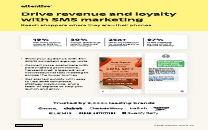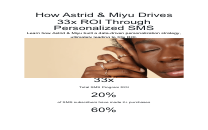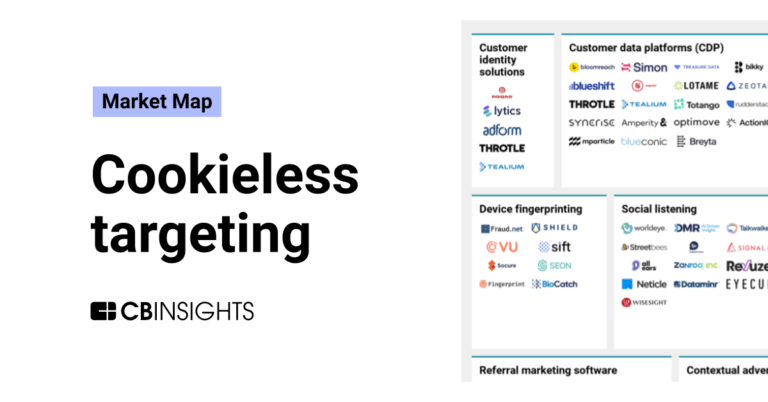
Attentive
Founded Year
2016Stage
Unattributed VC | AliveTotal Raised
$864.52MMosaic Score The Mosaic Score is an algorithm that measures the overall financial health and market potential of private companies.
-22 points in the past 30 days
About Attentive
Attentive provides a personalized text messaging platform. It offers a short message service (SMS) marketing platform allowing retail and electronic commerce brands to connect with consumers, providing solutions such as marketing automation, growth marketing, retention marketing, audience management, messaging, and business intelligence. It offers its services to electronic commerce and the retail sector. The company was founded in 2016 and is based in Hoboken, New Jersey.
Loading...
Attentive's Product Videos


ESPs containing Attentive
The ESP matrix leverages data and analyst insight to identify and rank leading companies in a given technology landscape.
The marketing automation personalization market is focused on providing personalized and relevant experiences to customers across various digital channels. Vendors in this market offer solutions that use AI and data analytics to create personalized content and messaging for each customer, resulting in increased engagement, conversion rates, and customer loyalty. The market includes a range of prod…
Attentive named as Leader among 15 other companies, including Bloomreach, Oracle, and Braze.
Attentive's Products & Differentiators
SMS
SMS marketing messaging platform
Loading...
Research containing Attentive
Get data-driven expert analysis from the CB Insights Intelligence Unit.
CB Insights Intelligence Analysts have mentioned Attentive in 2 CB Insights research briefs, most recently on Aug 14, 2023.

Aug 14, 2023
The cookieless targeting market map
Apr 28, 2022 report
Why consumer & retail leaders are prioritizing business messaging solutionsExpert Collections containing Attentive
Expert Collections are analyst-curated lists that highlight the companies you need to know in the most important technology spaces.
Attentive is included in 8 Expert Collections, including E-Commerce.
E-Commerce
11,224 items
Companies that sell goods online (B2C), or enable the selling of goods online via tech solutions (B2B).
Unicorns- Billion Dollar Startups
1,270 items
Conference Exhibitors
5,302 items
Future Unicorns 2019
50 items
Sales & Customer Service Tech
1,058 items
Companies offering technology-driven solutions for brands and retailers to enable customer service before, during, and after in-store and online shopping.
Targeted Marketing Tech
453 items
This Collection includes companies building technology that enables marketing teams to identify, reach, and engage with consumers seamlessly across channels.
Attentive Patents
Attentive has filed 12 patents.
The 3 most popular patent topics include:
- computer security exploits
- payment systems
- social networking services

Application Date | Grant Date | Title | Related Topics | Status |
|---|---|---|---|---|
3/18/2024 | 3/11/2025 | Grant |
Application Date | 3/18/2024 |
|---|---|
Grant Date | 3/11/2025 |
Title | |
Related Topics | |
Status | Grant |
Latest Attentive News
Mar 3, 2025
Many have taken to TikTok – the site of much of their frustration – to declare that they are participating in “Low Buy 2025” or “No Buy 2025” and sharing the ways they are curbing their spending.PHOTO: ST FILE Jordyn Holman and Aimee Ortiz UPDATED Mar 03, 2025, 08:55 AM Thanks for sharing! Too much, in fact. Shopping on her phone had become so easy it had turned into a bad habit. She bought a cake decorating kit, thinking she’d make her own birthday cake, and never even took it out of the box. She has at least 80 bottles of perfume stored in her closet. And despite all the clothes she has purchased, she feels she has nothing to wear. “Clearly my buying has gotten to a place where it’s bordering on hoarding,” Ms Orakpo said. So toward the end of 2024, Ms Orakpo, 31, who lives in Houston, pledged to tame her buying habits. The first step was to scrub her accounts: She unsubscribed from daily emails from Shein; she changed her TikTok settings to avoid personalised ads; she blocked Temu on the social platform X. She also opted out of texts from brands like Fashion Nova, her nail salon and even her local bubble tea shop. And then she told her more than 2,500 followers on TikTok about it. Ms Orakpo joined a growing group of shoppers who are fed up with a constant barrage of marketing in their social feeds and phone alerts. Many have taken to TikTok – the site of much of their frustration – to declare that they are participating in “Low Buy 2025” or “No Buy 2025” and sharing the ways they are curbing their spending. Some “shop their closet,” and others pledge to make sure their containers of blush hit pan before being enticed into buying a new one. The videos have garnered millions of views since the start of the year. The zeal that is driving this trend is as much a pushback against the forces of a consumerist culture as it is about saving money, with scorn for corporate manipulation mixed in with tips for changing personal habits. On the scorn end of the spectrum was a call for an “economic blackout” on Feb 28 by the People’s Union USA, which says it is fighting “an economy designed to exploit workers, suppress wages and keep the majority of us in a constant state of struggle.” The group asked people not to buy from large corporations – in person or online – for 24 hours. Avoiding sales pitches from big corporations, however, is harder than ever. As more Americans spend time on social media, brands have flocked there to capture attention and dollars. In 2025, businesses are expected to spend nearly US$103 billion (S$138 billion) in advertising on social media, a 175 per cent increase since 2021, according to Emarketer, a market research company. On TikTok, ads for phone stands, wigs and kitchen sink strainers are nearly indistinguishable from content creators opining about reality-TV shows and politics. TikTok Shop, where people can make purchases without leaving the platform, was the single largest driver of US social commerce sales growth in 2024, said Ms Jasmine Enberg, principal analyst at Emarketer. Nearly half of TikTok users are expected to make at least one purchase on the platform this year, she added. People are also buying things on Instagram, Facebook Marketplace and YouTube. According to a Bankrate survey released in September 2023, Americans spent US$71 billion on impulse purchases on social media over 2024 – purchases that often ended in feelings of regret. Ms Orakpo is among the regretful. But now she’s determined to resist the wiles of advertisers who invade her phone on social media, email and text. “It’s a whole ecosystem, and it’s hard to avoid. But it is feeling predatory, it is feeling like manipulation,” Ms Orakpo said. “It is getting heavy.” Addicted to Buying For those trying to curb their shopping habits, social media can be a hazardous place. “The more time you spend on social media, the more inclined you are to engage with your favorite brands but also buy impulsively, make unplanned purchases,” said Dr Angeliki Nikolinakou, an associate professor at the University of Western Macedonia in Greece, who cowrote a 2024 paper on the subject. For some, social media can aggravate a recognized disorder sometimes called compulsive buying behavior, which, according to a 2015 meta-analysis of studies from 16 countries, affects roughly 5% of adults. Modern marketing strategies – having influencers hawk products and promote hauls, and creating urgency through games or short promotion windows (One item left! Selling fast!) – can have a real effect on people who shop compulsively, said Dr Astrid Muller, an associate professor at Hannover Medical School in Germany who studies compulsive buying behavior. “There may be constant social comparison or even competitivelike exchange in forums about ‘hunting’ for and purchasing particular goods or merchandise products,” Dr Muller said. More on this Topic Ms Hannah Radke, 33, a home health care worker in Nampa, Idaho, said her compulsive shopping habits worsened when she became a mother and started buying things for her daughter. She found herself scrolling Facebook Marketplace, looking for deals during down time at work and late at night after her daughter went to bed. Her social media feed was a cornucopia of irresistible ads and holiday sales pitches. She’d be enticed to add items to her cart to meet a retailer’s minimum order value, buying more things – often frivolous – than she had meant to. “My shopping addiction is about the high that I get when I buy something and have something new or I have a package coming in the mail or I get to open something,” Ms Radke said. Having bought multiple sets of the same items, she has pajamas, blankets and toys that have never been used. In 2022, she was sentenced to probation and community service after being caught swapping tags on items in a store. Afterward, she opened up about her shopping compulsion to her therapist. Ms Radke now finds comfort at Shopping Addiction Support, a private Facebook group with more than 14,000 members. Members post about their struggles with compulsive shopping, paying their bills and disappointing their loved ones. Other communities for people trying to address their compulsive shopping include Shoplifters Anonymous, a 12-step community that is modeled after Alcoholics Anonymous and meets by videoconference every week. Ms Radke owes about US$15,000 to family members and debt collectors, but she is working two jobs and sticking to her budget. “I don’t know if I will ever be able to fix my credit score,” she said. “But at least I am not ruining my family relationships over my shopping anymore.” More on this Topic Some people might consider Mr Amit Jhawar part of the problem: As the CEO of Attentive, he sends brand messages by way of texts to your phone. But Ms Jhawar says he is part of the solution. People are overwhelmed. He gets it. But companies have to get their messages out, and customers do want to know about sales and updates from their favorite brands. He thinks marketing that is more personalised – and easier to opt out of – is better for everybody. That’s where texting comes in. Companies like texts because people open them faster than emails, and texts feel more personal and easier to engage with. And it’s easier to opt out of text messages than to unsubscribe from email, so brands have to be more careful about what they send consumers for fear of alienating them, Mr Jhawar said. Brands often offer customers a discount in return for signing up for the Attentive messages. “We’re not sending you crappy messages that you have to go and sort through and delete and get all these notifications that aren’t relevant,” said Mr Jhawar, who previously was the Venmo CEO. A year and a half ago, Attentive, which has more than 8,000 clients, including Crate and Barrel, Hoka and Supergoop, began using artificial intelligence that uses profiles of customers to create personalised messages for them. Now the company can analyse micromoments of shoppers’ behavior, Mr Jhawar said, including the time of day they usually browse or whether they zoom in on an image of a product on a retailer’s site. If they leave the website without purchasing, Attentive can tailor a message to entice the shopper back to the site, like a mobile salesperson trying to close a deal. “What we’re trying to do is optimize each one of those touch points to make it relevant for that consumer,” he said. More on this Topic Mr Jhawar’s company is one of many in the marketing industry that are approaching customers with tailored messages through texts, ads or emails. The industry is expected to become a US$786 billion business by 2026. But for those who are taking the “No Buy” approach this year, the brands’ personalised communication doesn’t necessarily feel welcoming. And texts can feel particularly disruptive. “You’re already getting emails and texts from bills that you have to pay,” Ms Orakpo said. “People would be more receptive if it was once in a while,” she said about that form of marketing. “It gives greedy. It gives capitalism.” The Resistance In online communities for shopping addictions and overspending, people trade tips and tricks on how to resist the sophisticated marketing strategies of people like Mr Jhawar. Ms Lea Toshiye Roache, 34, a content creator in Dallas, pledged with a group of friends to spend less this year. Ms Roache, who described herself as a “slight shopaholic,” has unfollowed brands on social media and unsubscribed to their emails and texts. She created rules that give her some leeway: “self-care” once a month or an “I just simply want it” purchase once a quarter. “Spending bans are great, and looking at your finances is great,” she said, “but also make it realistic so that you can still be successful.” Ms Devon Rule is a founder and head of growth at Indyx, an app that helps people create a digital catalog of all the stuff in their closets. The service, which has a paid subscription option, started in 2022 and saw a large number of downloads Jan. 1, which Rule took as a sign of “No Buy” intentions. “The business model is not selling you new stuff. It’s about helping you use what you have,” said Rule, who is based in San Francisco and previously worked at fashion brands like Gap. “The idea is we’re competing with shopping.” The financial incentive for the retail industry, or the “machine,” as she called it, is focused on persuading people to buy more items more frequently. And the internet and all of its tools allow shoppers to be “marketed to constantly, all the time,” she said. “My take is it’s unrealistic to look to brands to moderate us on this,” Ms Rule said. Instead, she said, consumers need ask questions of themselves. Will they really wear the black yoga pants being advertised to them, or will the purchase just sit among the piles in an already bulging drawer? Ms Orakpo, with the unused cake set, agrees. On TikTok, she has taken to quickly scrolling past influencers’ videos and any content from TikTok Shop. “I think it just comes down to me being in the practice of scrolling past,” she said. NYTIMES More on this Topic
Attentive Frequently Asked Questions (FAQ)
When was Attentive founded?
Attentive was founded in 2016.
Where is Attentive's headquarters?
Attentive's headquarters is located at 221 River Street, Hoboken.
What is Attentive's latest funding round?
Attentive's latest funding round is Unattributed VC.
How much did Attentive raise?
Attentive raised a total of $864.52M.
Who are the investors of Attentive?
Investors of Attentive include Bossa Invest, Karmel Capital, CrossWork, Disney Accelerator, Institutional Venture Partners and 13 more.
Who are Attentive's competitors?
Competitors of Attentive include Bluecore, Regal, Brevo, Intellimize, Persoo and 7 more.
What products does Attentive offer?
Attentive's products include SMS and 1 more.
Who are Attentive's customers?
Customers of Attentive include GUESS, Neiman Marcus, Claire's, CB2 and Rebecca Minkoff.
Loading...
Compare Attentive to Competitors

Brevo provides customer relationship management and marketing services. The company offers tools for businesses to execute digital marketing campaigns, send transactional messages, and utilize marketing automation features. It primarily serves the marketing industry. Brevo was formerly known as SendinBlue. It was founded in 2012 and is based in Paris, France.

Bluecore provides retail marketing technology focused on customer identification and movement within the purchase funnel. It offers a platform for enterprise brands to automate personalized marketing campaigns across various channels, utilizing real-time data and predictive analytics. Bluecore's solutions are tailored for the retail sector, with the goal of improving customer retention and supporting growth for brands. Bluecore was formerly known as TriggerMail. It was founded in 2013 and is based in New York, New York.

ActiveCampaign focuses on customer experience automation, operating within the marketing automation, email marketing, and Customer Relationship Management (CRM) sectors. The company offers services, including email marketing, marketing automation, e-commerce marketing, and CRM tools designed to help businesses engage meaningfully with their customers. ActiveCampaign primarily serves businesses of all sizes across various sectors, with a particular emphasis on the e-commerce industry. It was founded in 2003 and is based in Chicago, Illinois.

Rokt focuses on electronic commerce technology. The company offers solutions to increase revenue, acquire customers at scale, and form relationships with existing customers. Its solutions include optimizing and monetizing the checkout experience, providing payment providers during checkout, and offering premium post-purchase offers. The company operates in the e-commerce sector. It was founded in 2012 and is based in New York, New York.

Konnecto focuses on partnership intelligence in the affiliate marketing sector. It provides services such as affiliate discovery, performance monitoring, competitive benchmarking, and fraud detection. It primarily serves consumer brands aiming to enhance online sales through strategic collaborations. It was founded in 2018 and is based in Tel Aviv, Israel.

ForMotiv specializes in behavioral analytics within the insurance sector and provides insights into the intent and risk associated with digital applicants. The company offers solutions that analyze behavioral data in real-time to predict user intent and assess risk, which aids in improving conversion rates and reducing fraud. ForMotiv's services are primarily utilized by the insurance industry, enhancing digital experiences and decision-making processes for life, home, auto, and commercial insurance providers. It was founded in 2018 and is based in Philadelphia, Pennsylvania.
Loading...
